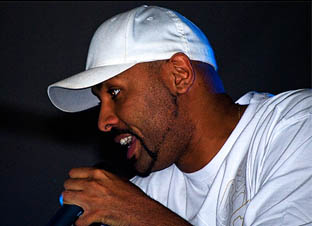
Hip-hop musician Domingo Antonio Edjang Moreno, known as El Chojin, will hold a conference on Wednesday, 10 December 19:00, in La Nau Cultural Centre to commemorate the anniversary of the Universal Declaration of Human Rights, held that day. The renowned raper will explain how hip hop acts also as an intermediary to talk about the human rights, gender violence, inequality, racism, xenophobia, pursuit the different, and how to react to these situations.
The title of the conference is “The right versus wrong...this is Hip-Hop” (Lo correcto frente a lo incorrecto... esto es Hip-Hop). El Chojín will be presented by Cristina García, director of the Master’s Degree in Human Rights, Democracy and International Justice, and by Javier de Lucas, full university professor of the Department of Moral and Political Legal Philosophy at the Institute of Human Rights (IDH by its Spanish initials) of the Universitat de València. Antonio Ariño, Vice-Principal for Culture and Equality, will moderate the session.
The conference, that will take place in the Aula Magna at the historical building of the UV, is celebrated in a framework of Claustre Obert, a space for debate and reflection created by the Office of the Vice-Principal for Culture and Equality and the newspaper El País, to analise the most important issues of social, cultural and economic news. Furthermore, the act is framed in the conference cycle organised by the Institute of Human Rights of the Universitat de València and the Office of the Vice-principal for Culture and Equalty, entitled “Other look about human rights” (Otra mirada sobre los derechos humanos) and every two months suggests a conference-colloquium with a figure from art, literature, music, teathre or cinema. This way, along 2015, Conferences of Juan Diego Botto, Juan Mayorga, David Trueba, Nicolás Castellano and Olga Rodríguez are planned.
Last November, El Chojin received the award “Commitment against intolerance, because one of the main issues that this hip-hop musician broaches in his lyrics and most of his LP is discrimination, abuse and in general, injustice. The fight against gender violence and awareness towards the phenomenon of immigration is also present in his work. The fact is that El Chojin was born and raised in Spain, but he perfectly knows this problem due to his African roots and he has raised the cause many times. In fact, as it is reflected in his songs “I’m not like them” (Yo no soy de esos), “Mummy, the black is furious” (Mami el negro está rabioso) or “Dirty face” (Cara sucia), himself has experienced this discrimination because of his skin colour. In 2009 he officially became the fastest raper in the world achieving a Guiness World Record after being able to sing 921 syllables in 60 seconds. In 2010 he preserved the rap music in the newscast of La 2 of TVE, displaying an editorial in which weekly the rapper offered his views on current events. El Chojin writes poetry, articles and different texts. He has been the host of the weekly program “Ritmo Urbano”, that La 2 dedicated during four seasons to hip hop culture.
About IDH
Created in 2005, and managed nowadays by the teacher Consuelo Ramón, the Institute of Human Rights of the Universitat de València has received an Excellence Mention from the Ministry of Education for its program of Doctorate Human Rights, Democracy and International Justice. In 2008 IDH obtained support inside the program Consolider-Ingenio 2010. The institute takes part of a project in which twelve research groups from different Spanish Universities participate, coordinated by the Institute of Human Rights Bartolomé de las Casas of the University Carlos III of Madrid. The selected project is called “Time for rights” (El tiempo de los derechos) and his main researcher has been the teacher Gregorio Peces-Barba. Consolider-Ingenio 2010 is the main financing support of the National Plan for Scientific Research, Development and Technological Innovation 2008-2011 for high quality projects. It was the first time that a team of researchers from the legal field received such aid, mainly addressed to remote scientific contexts of Humanities and Social Sciences.
Last update: 9 de december de 2014 09:17.
News release



















